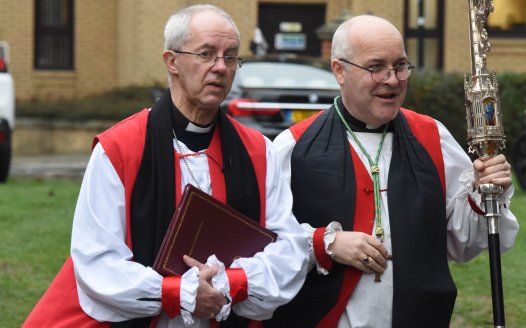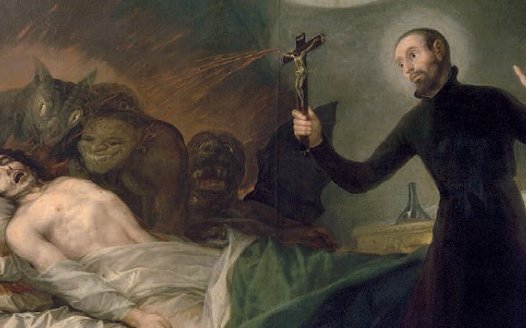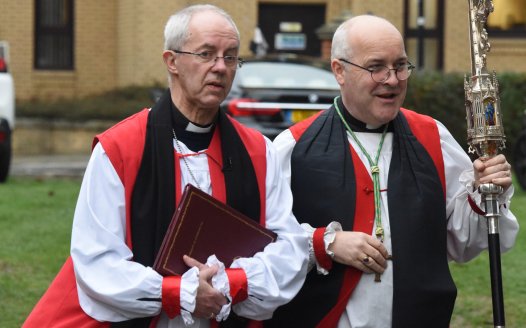Damning details emerge about establishment cover-up of Anglican sex abuse
Posted: Mon, 4th Jan 2016 by Keith Porteous Wood
New revelations about the extent of the letter-writing campaign to help disgraced bishop Peter Ball escape charges raise urgent questions about the extent of the establishment cover-up, writes Keith Porteous Wood.
Former Bishop of Gloucester Peter Ball was recently jailed for 32 months aged 83 for offences relating to sexual activity with almost twenty young males. The Crown Prosecution Service had investigated allegations twenty years earlier but they had told Ball in 1993 that despite "sufficient admissible, substantial and reliable evidence" it was prepared to deal with the matter out of court. Ball was let off with a caution and resigned as bishop.
It is widely thought that Ball escaped more serious charges and a trial in 1993 because of a massive establishment cover-up; numerous letters were sent to justice authorities on Ball's behalf.
Freedom of Information requests, including by the Telegraph, Times and the BBC, have led to the release of a few of these letters and confirm that some were from key establishment figures. A former Home Office Secretary of State (now Rt Hon Lord Renton) wrote, seemingly accepting the accusations, that "the further shame of criminal action seems far too great a punishment". The Rt Hon Lord Justice Lloyd wrote to both the Detective Inspector and Chief Constable describing Ball as "the most … saintly man I have ever met", thanking the former for "being so understanding when we spoke on the telephone". Several senior masters from public schools also wrote.
That the letters were orchestrated is suggested by a phrase used in a letter from Radley College Abingdon: "I gather it may be helpful for you to hear from those who have known Bishop Peter Ball for a long period of time." Who suggested that "it may be helpful"?
A number of the letters released are, predictably, from senior figures in the Church including two (now former) Archbishops of Canterbury. Archbishop of Canterbury at the time Lord Carey wrote at least two of these letters, one to the Director of the Crown Prosecution Service and another to the relevant Chief Constable.
The letters contained passages like: "while being keenly conscious of the need to avoid any suggestion that I might be trying to influence the police enquiries", and, "… in no way whatsoever would I wish to influence you about the decision over Bishop Ball", and "'special pleading' would be entirely inappropriate; at the same time …". Similar phrases occurred in several of the letters from others.
But what other motive, other than the desire to influence any decision by the police and the CPS, could Lord Carey have had for writing the letters?
One victim of Bishop Ball, Phil Johnson, told the BBC in an interview screened on 1 January that if there was no intention to influence, why did Lord Carey write the letters at all?
The letters could not have been more manipulative. Lord Carey wrote of his "urgent concern" about Ball's health or to the police that he was "anxious", making representations of the "excruciating pain and spiritual torment which these allegations have brought upon [Ball]", and extolling at length on his achievements and ministry? Nor could they have been more effective. Why else would the CPS have withdrawn charges just days after receiving Lord Carey's pleas, as The Times reported on 5 January? The CPS have recently conceded that this was the wrong decision.
According to the Press Association in September, Lord Carey said: "I was worried that if any other allegations of past indecency were made it would reignite. I wanted some reassurance that this would not be the case. … I was so troubled, that evening after dinner I went to my study. … I was supplied with a number of a man at the CPS I believed to be a director. I do not recall his name. … I rang him and asked what might happen if allegations from the past were made. … I was told quite categorically that the other allegations would not be taken further as far as we are concerned."
The letters and above conversation do not seem entirely consistent with a report in the Church Times on 7 October 2015: "A spokesman for Lord Carey has denied that he attempted to intervene in the case. 'He discussed the matter with the CPS after the caution had been given to Peter Ball. If there was a cover-up, he was unaware. The allegations were investigated by police, and he believed this was a proper investigation.'"
Perhaps most concerning of all is that the evidence emerging is not inconsistent with Lord Carey acting despite acknowledging the validity of the accusations and that they may be multiple. And surely it could not because of them: He said, for example, "This seemed to me at first to be most improbable" [emphasis added] and he was at least aware of the possibility of further accusations: He said he was "worried" about "any other allegations of past indecency" that might be made. These concerns are strengthened by evidence that has now emerged in The Times that his Chief of Staff at the time, Bishop Ronald Gordon declined the prospect of further information that had become available about Ball's nefarious activities because he had "discussed the correspondence the archbishop had received referring to past events in PB's life" and there was "already enough evidence to suggest a picture of what has been happening".
Richard Scorer, a senior lawyer specialising in such cases and author of a book on child abuse in the Roman Catholic Church, stated in The Times: "Unless Archbishop Carey has a very good explanation, this has all the hallmarks of a cover-up. … It appears to the victims that he was more concerned with ensuring Ball was treated leniently than about them."
One of the alleged victims, Neil Todd, attempted suicide several times, depressed about not being believed. He even went to Australia to start a new life, but committed suicide in 2013 following the revival of police enquiries.
Mr Scorer is demanding that Lord Carey publicly explain his actions, adding "We cannot have a system where certain people receive more lenient treatment than others, because of who they happen to know."
It seems improbable in the extreme that these letters were sent to the Police and CPS without being orchestrated. The perpetrators of this perversion of the course of justice must be exposed. Hopefully it will emerge, perhaps from the Independent Inquiry into Child Sexual Abuse, who was responsible for organising this high level campaign, of such magnitude that it apparently succeeded in perverting the course of justice.
Questions will be asked about a report in 1993 that according to the Sun: "church officials had pleaded with [alleged victim Neil Todd's] family not to go to the police."
Getting to the bottom of the shocking perversion of justice in the 1990s is important, but we should be even more concerned about the extent to which it pervaded the treatment of Ball in recent years. While the CPS belatedly admitted its wrong decision in 1993 there has been no explanation of why the CPS decided in 2015 against pressing charges against Ball on the most serious allegations concerning two teenage boys, albeit Ball pleaded not guilty to them. Ball has shamelessly maintained his innocence for decades, and on the other charges until the last moment, presumably only changing it to avoid a trial. Ball stopped at nothing – including deceiving the establishment and Royal Family – to perpetuate the lie of his innocence. His doing so has caused untold misery and may have cost Neil Todd his life. Was sparing him a trial a reward for changing his plea? If so was that an appropriate reward for him, having lied for decades with such devastating consequences?
Why was there no trial, one that would also have given his victims the opportunity to have their say in court? I am convinced that a trial would have revealed more of relevance about Ball's actions, but also of the Church's institutional bullying and intimidation of victims. The Rev Graham Sawyer claims he was denied ordination (he was eventually ordained in Australia) unless he was silent about being abused by Ball and that even in 2015 the Church's bishop in charge of safeguarding, the Bishop of Durham, refused to engage with victims, citing 'banking reform' as a greater priority.
Sawyer is adamant that there is a "fundamental bankruptcy" in the Church's handling of survivor responses and that people at the highest levels of the Church are more concerned with "saving face".
See also: "Carey knew of sex abuse when he defended Ball" in The Times (5/1/16)








